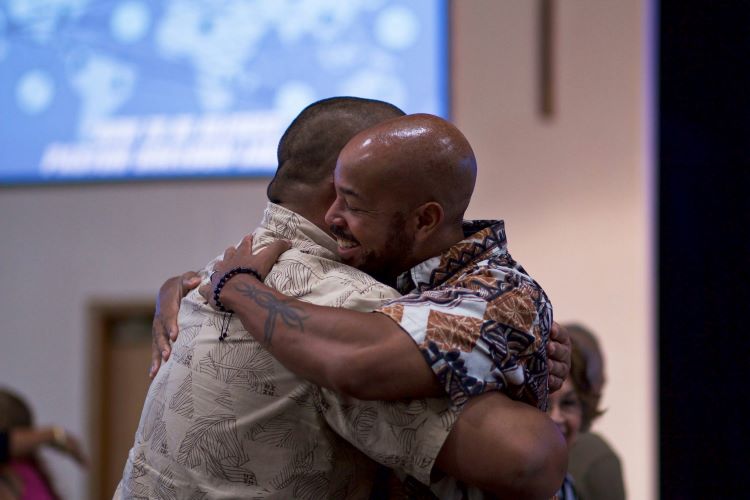Intervention for alcoholism is when family members and friends come together to confront a person with alcohol use disorder about their addiction.
Intervention for alcohol use disorder is designed to make the person realise the true scale of the alcohol problem.[1]
The best-case scenario after the intervention for alcoholism is that your loved one begins their recovery journey, but it’s best to prepare for every reaction they may have.
Some interventions result in abstinence from alcohol, but some people may be defensive and refuse to admit they have a problem.
Professional interventionists can help you prepare for these reactions, and ensure you’re prepared to have a helpful conversation.
What is Alcohol Use Disorder?

When someone’s drinking habits take over their life, it’s often hard for them to see and understand that they need help in the first place.
Their lives often become so chaotic that they are unable to see the negative consequences their alcohol consumption has been causing to their own life, as well as the lives of the people around them.
Getting a friend or a family member to admit to alcohol addiction and the effects-of-alcohol on their life can be tough; both for the person suffering and for the person trying to help their loved one.
This is partly due to the effect alcohol intake has on the frontal lobe part of the brain of a heavy drinker. This makes them incapable of making good decisions or thinking clearly.
Therefore, it’s usually easier for people on the outside of the addiction to see that there’s a problem than it is for the person actually suffering.
If you’ve struggled to get your loved one to admit there’s a problem, you may have been met with a brick wall.
This isn’t because your loved one or friend is selfish or stubborn. It’s simply because they are struggling to see things clearly right now.
At OK Rehab, we offer free advice from a team of non-judgemental professionals, many of whom are in recovery and understand what you and your loved one are going through.
To find out more about intervention for alcoholism, simply reach out to our 24/7, confidential hotline on 0800 326 5559.
How Long Does Alcohol Stay in Your System?

The physical symptoms of withdrawal will subside within around two days.
Detoxing from alcohol can be dangerous. Delirium tremens is a complication of quitting cold turkey which usually begins within 48-72 hours.
Ensure your loved one seeks medical advice before quitting if you are a heavy drinker.
What are the Negative Effects of Alcohol?
- Violent behaviour – or being a victim of violence
- Unprotected sex – this can lead to unplanned pregnancy or sexually transmitted infections (STIs)
- Accidents and injuries – sometimes requiring hospital treatment
- Loss of personal possessions – such as wallets, keys or mobile phones
- Alcohol poisoning – this may lead to vomiting, fits (seizures) and falling unconscious[2]
What is an Intervention for Alcoholism?

Intervention doesn’t need to be a big dramatic event. An intervention simply allows loved ones who care the opportunity to voice their concerns before their loved one’s situation becomes any worse.
An intervention can provide:
- The chance for friends and family to present the individual suffering with examples of how destructive their addiction has been on the individual and people around them
- The opportunity for medical or healthcare professionals and loved ones to explain any possible treatment that they believe may work at this stage
- Insight into the future consequences of their continued actions if they decide not to seek any help.
- A sense of control over the current situation
How Long Should an Intervention for Alcoholism Last?
Setting aside an hour for an intervention is a good estimate, but be prepared for it to be quicker or longer depending on:
- The severity of the addiction – People who have a more severe addiction may have a harder time talking and fighting the denial. You want to allow time for a breakthrough if the possibility is there
- Make time for the number of loved ones who would like to speak – Think about how long it will take for each person to say what they would like to say, so no one gets cut short
- Consider the steps involved in the intervention – Professional interventionists can help you decide the best approach for the intervention, and this may involve multiple steps
At OK Rehab, we offer free advice from a team of non-judgemental professionals, many of whom are in recovery and understand what you and your loved one are going through.
To find out more about intervention for alcoholism, simply reach out to our 24/7, confidential hotline on 0800 326 5559.
How Does a Person Get Addicted to Alcohol?

Everyone is different, so their reasons will be individual, but there are some common factors:
- Genetic – your genes could make you more susceptible to addiction
- Social – being exposed to alcohol by your friends and family can increase your chances
- Culture – the UK is a nation with a big drinking scene, making you more likely to encounter drink frequently
- Mental health – mental disorders, trauma and adverse life events can drive a person to try to cope with substances[3]
How Can I Tell if Someone is an Alcoholic?
The characteristics of alcoholics are:
- Shame – alcoholics feel shame and guilt for their addiction, but cannot stop
- Secrecy – they will usually hide bottles and try to act sober to avoid detection
- Accidents – there may be unexplained bruises or injuries from falls
- Confusion – they may have brain fog and seem disorientated [4]
When Is Intervention for Alcoholism Necessary?
An alcohol intervention is necessary when you no longer feel that your efforts are being taken seriously, listened to or actioned.
If you feel like you’re losing control over the situation and are struggling to know what to do next, a planned, group intervention might be the next step.
Most planned interventions from loved ones are most successful when they’re planned, fully educated and trained for the situation at hand. You may want to prepare and practice what you’re going to say beforehand.
What is the Goal of an Intervention?

Each intervention has its own goal. Some intentions might aim for total abstinence, and some might aim for the individual to simply admit they have an issue and begin to take the first steps to recovery.
It’s important that each goal is realistic for the individual. The goal and expectations put on the individual after the intervention must not be too unrealistic or optimistic.
Each individual’s motivation will work in a different way, so it’s important that you aim for the most realistic outcome whilst motivating the individual and staying positive.
At OK Rehab, we offer free advice from a team of non-judgemental professionals, many of whom are in recovery and understand what you and your loved one are going through.
To find out more about intervention for alcoholism, simply reach out to our 24/7, confidential hotline on 0800 326 5559.
What to Know Before Staging an Intervention
It’s important that before staying an intervention you arm yourself with as much knowledge as possible about the addiction itself and the process of recovery.
Successful interventions can’t be arranged overnight, so it’s important that you plan what you want to say carefully.
It’s useful to plan and think about who you want there at the intervention carefully, as well as thinking about the venue.
It’s a good idea to choose a calming venue for the intervention and not somewhere that may cause further stress or anxiety. For example, try and choose somewhere that’s private and away from the public.
It’s also a good idea beforehand to arrange a short rehearsal meeting with those attending. This will ensure that what you’re all saying is coherent and consistent; this way you’ll come across as a strong unit.
How to Stage an Intervention
A male interventionist talking at an intervention for alcoholism
Below, we outline the seven stages of a professional intervention:
Step 1 – Seek Professional Advice for an Intervention for Alcoholism
Before you do anything else, it’s important that you contact a qualified specialist to help you understand how addiction works, what needs to be done and how to do it.
Whether you speak to a specialist over the phone, over a zoom call or face-to-face, you should be seeking any advice you can get before approaching your loved one for intervention.
Even if they are unable to attend the actual intervention with you, they will be able to advise and equip you with the skills and knowledge to help your loved one.
Without this guidance, it may be difficult for you to hold your own during the intervention.
At OK Rehab, we offer free advice from a team of non-judgemental professionals, many of whom are in recovery and understand what you and your loved one are going through.
To find out more about intervention for alcoholism, simply reach out to our 24/7, confidential hotline on 0800 326 5559.
Step 2 – Gather Your Loved Ones Together
One man with his hand on another’s shoulder after an intervention for alcoholism
Once you’ve spoken to a professional and got the necessary advice, the next step is to gather your friends and family.
However, it’s important to choose who you want to present at the intervention wisely. You should aim to have a small group of people who the individual suffering trusts, cares about and looks up to.
This could include parents, spouses, siblings, friends or work colleagues. In some situations, children of the person suffering can also decide to be present.
However, it is not recommended that younger children attend the intervention as it might be a difficult or unpleasant experience for them.
Step 3 – Make a Plan of Action
Interventions can be extremely emotional, which is why it’s important to work with your loved ones, and even a professional if possible, to create and prepare a plan.
Making a plan means that you plan out what you want to say, and how you want to say it. This will ensure that everyone is on the same page going into the intervention, and that no one contradicts each other in front of the individual as this will likely only confuse things for them.
Step 4 – Gather the Necessary Information about the Situation

The next step is comparing notes and gathering the necessary information about the individual and their addiction.
It’s useful to share stories and insights about the individual with each other in an attempt to understand how their mind might be currently working.
Step 5 – Create Clear and Specific Boundaries
Lastly, it’s important that you decide on and set clear boundaries for the addict if they refuse to help. Refusing to help themselves should have a consequence, and these consequences should be extremely specific and pre-planned.
It’s a good idea to agree on a set of consequences as a group so that the consequences for the addict are clear and evident.
At OK Rehab, we offer free advice from a team of non-judgemental professionals, many of whom are in recovery and understand what you and your loved one are going through.
To find out more about intervention for alcoholism, simply reach out to our 24/7, confidential hotline on 0800 326 5559.
Step 6 – Practice What You Want to Say

Try and practice what you want to say so that it’s clear in your head. It might be a good idea to rehearse what you want to say and talk it through with someone else to get their opinion.
It’s also important to allow some time to think about not only what you want to say, but how you’re going to say it.
Think about your tone and body language, how can the way you hold yourself and approach the conversation make the individual suffering from the addiction feel safe and at ease?
What Else is Necessary for an Intervention for Addiction?

If you’re feeling nervous before an intervention, it’s important to remind yourself of the desired goal and outcome, and the good it could do in the long run.
If you’re feeling this way, it’s a good idea to share your nervousness and apprehension with the rest of the group attending the intervention, as they probably feel the same.
Interventions can be a great way to share how you’re feeling with your loved one, and if carried out and executed correctly, can be life-changing for some addicts and their loved ones.
What should I do After Intervention for Alcoholism?
Following through with intervention can feel nerve-racking, and it’s completely normal to feel apprehensive and hesitant before an intervention.
This is actually one of the hardest parts of the intervention, as you’ll need to navigate the obstacles of life while helping your loved one maintain motivation.
How do I Maintain Motivation After Intervention for Alcoholism?

Ensure the options you chose during the intervention is considered immediately, and start taking the first steps.
If you have chosen rehab, you could ring your chosen rehab clinic at the first available opportunity.
How do I Get My Loved One to Follow Through After Intervention for Alcoholism?
If they begin to change their mind and go back on their word after the intervention, remind them in summary all of the people who attended and the things they had to say.
Remind them of what their life could be without addiction.
You could also consider staging a follow up intervention if necessary.
Ensure you don’t get frustrated. If they choose not to change, you cannot force your loved one to get better.
At OK Rehab, we offer free advice from a team of non-judgemental professionals, many of whom are in recovery and understand what you and your loved one are going through.
To find out more about intervention for alcoholism, simply reach out to our 24/7, confidential hotline on 0800 326 5559.
What is Alcohol Rehab?

- Mental health issues
- Addiction counselling
- Coping strategies to prevent relapse
- Aftercare to support you in your future
How Can Rehab Improve My Loved One’s Recovery Journey?
At OK Rehab, we offer free advice from a team of non-judgemental professionals, many of whom are in recovery and understand what you and your loved one are going through.
To find out more about intervention for alcoholism, simply reach out to our 24/7, confidential hotline on 0800 326 5559.
Does Rehab Mean Abstinence From Alcohol?
How Can I Access More Help?
If you need any further information or help finding a rehab near you, don’t hesitate to get in touch.
At OK Rehab, we offer free advice from a team of non-judgemental professionals, many of whom are in recovery and understand what you and your loved one are going through.
To find out more about intervention for alcoholism, simply reach out to our 24/7, confidential hotline on 0800 326 5559.
References
[1] https://ps.psychiatryonline.org/doi/abs/10.1176/ps.34.11.1027
[2] https://www.nhs.uk/conditions/alcohol-misuse/
[3] https://books.google.co.uk/books?hl=en&lr=&id=eUD9HblgNW4C&oi=fnd&pg=PR11&dq=Intervention+for+Alcoholism&ots=ZOo79RWuqo&sig=cN6itW_x67X5xE7vkwCPrfUbwac&redir_esc=y#v=onepage&q=Intervention%20for%20Alcoholism&f=false 0










